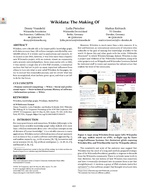Wikidata: The Making Of
From International Center for Computational Logic
Wikidata: The Making Of
Denny VrandečićDenny Vrandečić, Lydia PintscherLydia Pintscher, Markus KrötzschMarkus Krötzsch
Denny Vrandečić, Lydia Pintscher, Markus Krötzsch
Wikidata: The Making Of
In Ying Ding, Jie Tang, Juan F. Sequeda, Lora Aroyo,Carlos Castillo, Geert-Jan Houben, eds., Companion Proceedings of the ACM Web Conference 2023 (WWW'23), 615--624, 2023. ACM
Wikidata: The Making Of
In Ying Ding, Jie Tang, Juan F. Sequeda, Lora Aroyo,Carlos Castillo, Geert-Jan Houben, eds., Companion Proceedings of the ACM Web Conference 2023 (WWW'23), 615--624, 2023. ACM
- KurzfassungAbstract
Wikidata, now a decade old, is the largest public knowledge graph, with data on more than 100 million concepts contributed by over 560,000 editors. It is widely used in applications and research. At its launch in late 2012, however, it was little more than a hopeful new Wikimedia project, with no content, almost no community, and a severely restricted platform. Seven years earlier still, in 2005, it was merely a rough idea of a few PhD students, a conceptual nucleus that had yet to pick up many important influences from others to turn into what is now called Wikidata. In this paper, we try to recount this remarkable journey, and we review what has been accomplished, what has been given up on, and what is yet left to do for the future. - Bemerkung: Note: Theres is also an HTML version of this publication. This work is available freely under an open access license (CC By SA 4.0).
- Projekt:Project: SECAI, ScaDS.AI, Wikidata
- Forschungsgruppe:Research Group: Wissensbasierte SystemeKnowledge-Based Systems
@inproceedings{VPK2023,
author = {Denny Vrande{\v{c}}i{\'{c}} and Lydia Pintscher and Markus
Kr{\"{o}}tzsch},
title = {Wikidata: The Making Of},
editor = {Ying Ding and Jie Tang and Juan F. Sequeda and Lora Aroyo and
Carlos Castillo and Geert-Jan Houben},
booktitle = {Companion Proceedings of the {ACM} Web Conference 2023 (WWW'23)},
publisher = {ACM},
year = {2023},
pages = {615--624},
doi = {10.1145/3543873.3585579}
}
